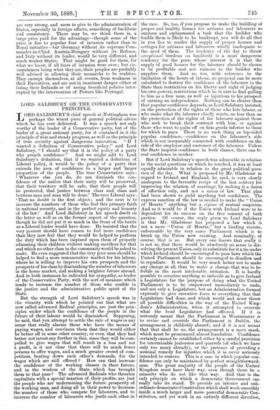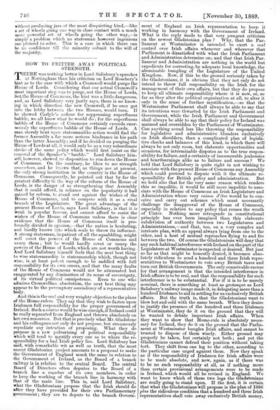LORD SALISBURY ON THE CONSERVATIVE PRINCIPLE.
TORD SALISBURY'S chief speech at Nottingham was perhaps the wisest piece of general political advice which he has ever delivered. It was a speech not only worthy of the leader of a Conservative party, but of the leader of a great national party, for it contained in it the principle of wise and steady progress, as well as the principle of true security against dangerous innovation. "If I wanted a definition of Conservative policy," said. Lord Salisbury, "I should say that it is the policy of a party who preach confidence." And we might add to Lord Salisbury's definition, that if we wanted a definition of Liberal policy, it would be the policy of a party that extends the area of confidence to a larger and larger proportion of the people. The true Conservative says : Whatever else you do, do not diminish the con- fidence of the nation that their unity will be preserved, that their territory will be safe, that their people will be protected, that justice between class and class and between man and man will be done.' The true Liberal says : That no doubt is the first object ; and the next is to increase the numbers of those who feel this primary faith in national security, and in the perfect equity and honesty of the law.' And Lord Salisbury in his speech dwelt on the latter as well as on the former aspect of the question, though he did not put it so much in the front of the battle as a Liberal leader would have done. He insisted that the very poorest should have reason to feel more confidence than they now feel that they would be helped to perform the duty which has been imposed upon them of properly educating their children without making sacrifices for that end which no other class in the community would be asked to make. He even suggested that the very poor man should be helped to find a more remunerative market for his labour, where he is willing to improve his own prospects and the prospects of his class by diminishing the number of labourers in the home market, and seeking a brighter future abroad. And in both instances he indicated his sympathy, as leader of the Conservative Party, with the sort of measure which tends to increase the number of those who confide in the justice and the administrative public spirit of the State.
But the strength of Lord Salisbury's speech was in the vivacity with which he pointed out that what are now called advanced Radical principles, are just the prin- ciples under which the confidence of the people in the future of their labour would be diminished. Supposing, he said, that you attempt to settle the rate of wages in any sense that really alarms those who have the means of paying wages, and convinces them that they would either be better off in some other country, or even that they had better not invest any further in this, since they will be com- pelled to give wages that will result in a loss and not a profit, is it not clear that there will be much fewer persons to offer wages, and a much greater crowd of com- petitors, beating down each other's demands, for the wages which are still offered ? How can that increase the confidence of the working classes in their future, and. in the wisdom of the State which has brought them to that pass ? The advanced Radicals who threaten capitalists with a special taxation of their profits, are just the people who are undermining the future prosperity of the working man, and doing all in their power to decrease the number of those who compete for labourers, and to increase the number of labourers who jostle each other in the race. So, too, if you propose to make the building of proper and healthy houses for artisans and labourers so onerous and embarrassed a task that the builder who builds them is likely to be bankrupt, you will do all that in you lies to render the supply of proper houses and cottages for artisans and labourers wholly inadequate to the need of them. The tendency of the day to throw exceptional burdens on landlords is a most dangerous tendency for the poor, whose interest it is that the supply of good houses for the labourer should be shown to be profitable and not ruinous to the builder who supplies them. And so, too, with reference to the limitation of the hours of labour, no proposal can be more calculated to destroy the confidence of the labourer in the State than restrictions on his liberty and right of judging his own powers, restrictions which he is sure to find galling to him as a free man, as well as injurious to his prospect of earning an independence. Nothing can be clearer than that popular confidence depends, as Lord Salisbury insisted, on the protection of the rights of those who hire labour, or who make what the labourer chiefly wants, no less than on the protection of the rights of the labourer against those who seek to break their contract with him, or against those who want to palm off on him goods inferior to those for which he pays. There is no such thing as lop-sided popular confidence,—confidence on the labourer's side which is not inseparably connected with confidence on the side of the employer and customer of the labourer. Unless the State inspires confidence in both classes, there can be real confidence in neither. • But if Lord Salisbury's speech was admirable in relation to the social questions on which he touched, it was at least equally admirable in relation to the great political ques- tion of the day. What is proposed by Mr. Gladstone in regard to Ireland and England, he said, is very closely analogous to the favourite recipe of the last century for improving the relation of marriage, by making it a union of affection only, and not a union of law. That plan had been shown to yield anything but confidence. The express sanction of the law is needed. to make the "Union of Hearts" anything but a regime of mutual suspicion. And so it would be if the Union with Ireland were to be dependent for its success on the free consent of both parties. Of course, the reply given to Lord Salisbury is that Mr. Gladstone has proposed a law which is not a mere "Union of Hearts," but a binding statute, enforceable by the very same Parliament which is to break up the Union now existing. And nominally, of course, that is so. But every one knows that really it is not so, that there would be absolutely no sense in die- solving the present Union, only to substitute for it a tie under which Ireland should be encouraged to pass laws which the United Parliament should be encouraged to disallow and to repudiate. It would be very much better not to make any change at all, than to make a change that was to be fertile in the most intolerable irritation. It is hardly possible to conceive anything so imbecile as to give Ireland a Legislature for the purpose of doing what the United Parliament is to be empowered immediately to undo, and not only a Legislature, but an Administration formed expressly to give executive force to everything that that Legislature had done, and which would and must throw all possible difficulties in the way of the United King- dom's Administration, when it attempted to overrule what the local Legislature had effected. If it is seriously meant that the Parliament in Westminster is to revise and override the Parliament in Dublin, the arrangement is childishly absurd ; and if it is not meant that that shall be so, the arrangement is a mere mask, which must be pronounced almost fraudulent. Confidence certainly cannot be established either by a careful provision for interminable jealousies and quarrels (of which we have only too many already), or the pretence of providing a nominal remedy for injustice which it is never seriously intended to remove. This is a case in which popular con- fidence can only be maintained by perfect straightforward- ness. The great majority of the people of the United Kingdom must have their way, even though there be a minority who do not like that way. And. that is the only principle on which a democratic Government can really take its stand. To provide an interior and sub- ordinate democratic Constitution which shall work smoothly inside a much larger and more powerful democratic Con- stitution, and yet work in an entirely different direction, without producing jars of the most disquieting kind,—like a set of wheels going one way in close contact with a much more powerful set of wheels going the other way,—is simply a problem which no statesman however ingenious ean pretend to solve. This is a case in which there can be no confidence till the minority submit to the will of the majority.







































 Previous page
Previous page